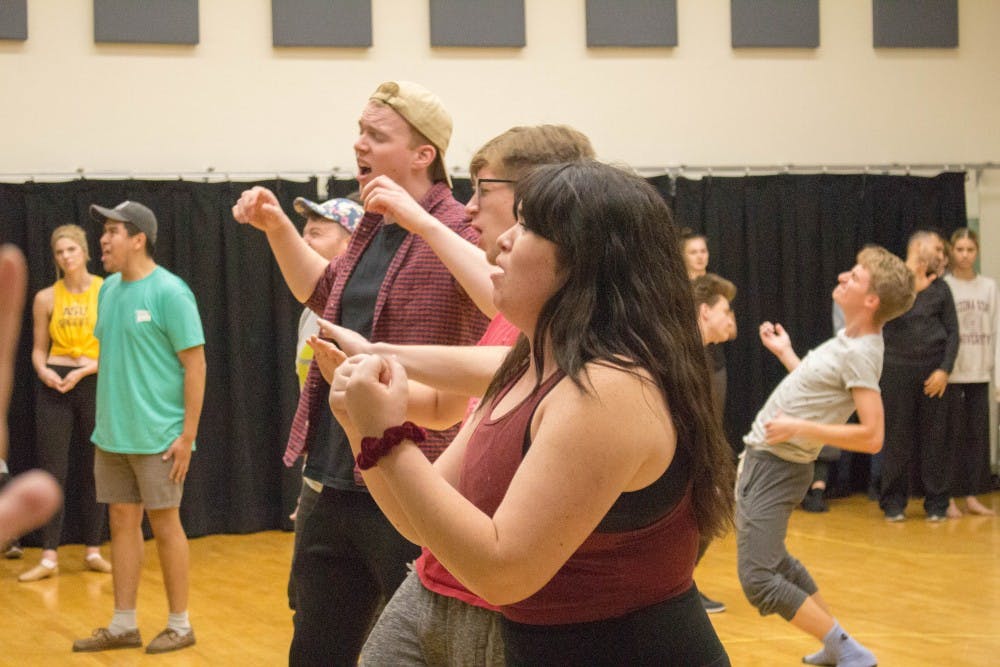Theaters and symphonies around the world are celebrating the centennial of American composer and conductor Leonard Bernstein’s birthday.
Bernstein, born August 25, 1918, is most well-known for works like West Side Story, Candide and his musical adaptation of Peter Pan. The celebrations started as early as Summer 2017 and will go through summer of 2019.
ASU’s Herberger Institute’s schools of Film, Dance and Theater and Music have joined forces alongside the ASU Symphony Orchestra, ASU Music Theater and Opera, ASU Choral Ensembles and Phoenix Boys Choir to bring Bernstein’s musical theater piece “Mass: A Theater Piece for Singers, Players and Dancers” to Tempe.
The show, which will be at ASU Gammage Nov. 17 and 18, will feature hundreds of actors, dancers, musicians and singers along with guest performer Jubilant Sykes.
David Lefkowich, the production’s stage director, said they made small changes to the play to include the use of modern technology and address modern issues to help immerse the audience in the narrative.
“When you see a production like Hamilton, you get to sit back and watch it and have a great time,” he said. “This piece, you also get to sit and have a great time, but our goal and Bernstein’s goal too … is to have the audience feel like they are a participant, and so that's what we'll be doing over the course of the show is slowly, lightly bringing the audience in.”
The piece was originally written for the 1971 inauguration of the Kennedy Center for the Performing Arts in Washington D.C. and reflects many of that era’s social and political dilemmas through the structure of a Roman Catholic Mass.
When the show was originally released, it was controversial because of its blending of artistic genres and its portrayal of questioning faith. Multiple productions were cancelled at the request of the Roman Catholic Church.
Armani Moten, a freshman double majoring in dance and journalism, is a dancer from the School of Film, Dance and Theatre and performs in both of the production’s choruses.
Moten said she is one of two African-American (dancers) in the cast and taking part in both sides of the play’s “push-pull” between the pious robed chorus and the laid-back street chorus allows her to break out of what others expect her to be as a performer.
“I'm showing (a) lot of different people and the dance community that I am not just a hip-hopper, that I can do ballet and I can do modern. I can do contemporary,” she said. “It’s going to be a little eye opener for a lot of people that had their prejudgments of me … I'm really excited to prove them wrong.”
David Schildkret, the production’s choral master, said this eclectic mixing of genres is what the show is all about.
“I think Bernstein wanted to make the point that the Kennedy Center was a place for everything, that everything was welcome there, so he tried to include as much as he could think of in this piece,” he said. “I think that message that there’s a place for everything in the arts and in our arts and in our University, and that it can all exist side by side at the same time, is a really important message for us to hear today and to think about.”
For street chorus singer Ariana Warren, a second-year masters student studying opera, the show holds many of the questions and issues religious people face in our country today.
“I think as a Christian, in my eyes, you have a relationship with God, and it's not always happy,” she said. “It's not always pleasant when things get really hard in life, at least for me. I sometimes question God and I get mad at God, and I think other people go through similar experiences as that.”
Jeff Meyer, the show’s conductor and musical director, said the show can serve as an inspiration for everyone who sees it.
“I think it does have the potential to make people reflect just a little bit about what's important in life,” he said. “I mean, you know, we can't solve all our problems through art alone, but I think the space that a production like this creates for the audience is unique and almost sacred, and that's powerful.”
Moten said the show’s message transcends religion and all students should see the production.
“At the end you'll see that everything comes together and it's just like, ‘Be you. Everyone should accept you for you,’” she said. “It matters today in this world because … people don't understand that we're all people. The same God that made you made me, and we all bleed red.”
Tickets are now on sale on the ASU Gammage website.
Correction: A previous version of this story stated that Armani Moten was one of two African Americans in the cast. She is one of two African American dancers in the cast. The story has been updated to reflect this change.
Reach the reporter at mrobbin9@asu.edu or follow @MelissaARobbins on Twitter.
Like The State Press on Facebook and follow @statepress on Twitter.




